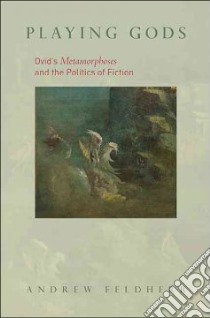- Libreria
- >
- Libri in lingua
- >
Playing Gods - 9780691138145
Un libro in lingua di Andrew Feldherr edito da Princeton Univ Pr, 2010
- € 72.30
- Il prezzo è variabile in funzione del cambio della valuta d’origine
"This is a major study of a major poet, a book that will have to be taken very seriously by all students of Ovid and Augustan literature. It also has much to offer anyone who is interested in the cultural politics of other places and other times. Andrew Feldherr shows familiar passages in new, often startlingly new, lights."---Philip Hardie, Trinity College, University of Cambridge
"This fascinating book is a major achievement. Insightful and often brilliant, it sets a new standard for sustained close reading of Ovid. Andrew Feldherr brings the discussion of the politics of Ovidian metamorphosis to a new level of critical sophistication. What he has to say about the nature of poetic fiction, the ethics of representation and interpretation, and the complex interrelationship of poetics and politics is bound to stimulate, provoke, and in most cases convince."---Joy Connolly, New York University
This book offers a novel interpretation of politics and identity in Ovid's epic poem of transformations, the Metamorphoses. Reexamining the emphatically fictional character of the poem, Playing Gods argues that Ovid uses the problem of fiction in the text to redefine the power of poetry in Augustan Rome. The book also provides the fullest account yet of how the poem relates to the range of cultural phenomena that defined and projected Augustan authority, including spectacle, theater, and the visual arts.
Andrew Feldherr argues that a key to the political as well as literary power of the Metamorphoses is the way it manipulates its readers' awareness that its stories cannot possibly be true. By continually juxtaposing the imaginary and the real, Ovid shows how a poem made up of fictions can and cannot acquire the authority and presence of other discursive forms. One important way that the poem does this is through narratives that create a "double vision" by casting characters as both mythical figures and enduring presences in the physical landscapes of its readers. This narrative device creates the kind of tensions between identification and distance that Augustan Romans would have felt when experiencing imperial spectacle and other contemporary cultural forms.
Full of original interpretations, Playing Gods constructs a model for political readings of fiction that will be useful not only to classicists but to literary theorists and cultural historians in other fields.
Informazioni bibliografiche
- Titolo del Libro in lingua: Playing Gods
- Sottotitolo: Ovid's Metamorphoses and the Politics of Fiction
- Autore: Andrew Feldherr
- Editore: Princeton Univ Pr
- Collana: (Hardcover)
- Data di Pubblicazione: 26 Gennaio '10
- Genere: LITERARY CRITICISM
- Argomenti : Fables, Latin History and criticism Politics and literature Rome
- Pagine: 328
- ISBN-10: 0691138141
- EAN-13: 9780691138145


